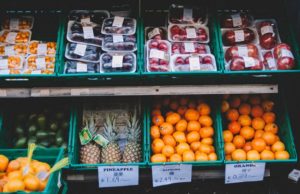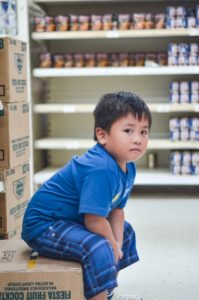 Being sanctioned as the Asia’s fattest country with approximately half of the population overweight or obese1, we are often, fortunately but shamefully, worried over the choices of food to eat unlike the other 820 million people around the globe whose concerns are not having enough to eat2. The unexpected strike of Covid-19 pandemic has shed light on the otherwise overlooked hunger epidemic in our country. This issue is not limited to those living in the rural settings alone but looms over the urban poor as well3. The prevalence of undernourishment in Malaysia in 2017 is 2.5% of the population4which may seem merely significant relative to the prevalence of overweight and obesity. However, the effects of hunger on the inflicted individuals are devastating. When food is scarce, whether the food is healthy or nutritious is out of the question. Another issue revolving food during this challenging time is the level of food safety. The last thing we need during this overwhelming pandemic is an epidemic of food poisoning.
Being sanctioned as the Asia’s fattest country with approximately half of the population overweight or obese1, we are often, fortunately but shamefully, worried over the choices of food to eat unlike the other 820 million people around the globe whose concerns are not having enough to eat2. The unexpected strike of Covid-19 pandemic has shed light on the otherwise overlooked hunger epidemic in our country. This issue is not limited to those living in the rural settings alone but looms over the urban poor as well3. The prevalence of undernourishment in Malaysia in 2017 is 2.5% of the population4which may seem merely significant relative to the prevalence of overweight and obesity. However, the effects of hunger on the inflicted individuals are devastating. When food is scarce, whether the food is healthy or nutritious is out of the question. Another issue revolving food during this challenging time is the level of food safety. The last thing we need during this overwhelming pandemic is an epidemic of food poisoning.
Overeating – Malaysians’ all-time tradition
Instead of eating to live, we, Malaysians consume food as if we live to eat. Being a multiethnic country, the menu we could choose from is diverse. Unfortunately, the nature of most of our local cuisines is nothing more than palatably satiable and far-fetched from being healthy, be it the ingredients or the method of preparation or both. This explains the prevalence of the non-communicable diseases among our population which has become the principal cause of death in Malaysia as of 20195. In view of this disaster, the Ministry of Health Malaysia has relentlessly put forward preventions at all levels possible. For instance, as a secondary prevention, comprehensive information regarding recommended diet plans for patients with non-communicable diseases such as diabetes, hypertension, hypercholesterolaemia and others, is made available online under the patient’s education section in the Ministry of Health’s official portal, MyHEALTH.
Addressing the barriers of healthy eating is the key of primary prevention. To name a few, the mentality that healthy food is expensive, the repulsive taste of healthy food which are associated with lack in flavours, the assumingly tedious and unfamiliar method of preparation, inconsistent meal time due to busy life schedule leading to binge eating and the absence of supportive people as well as the environment, are among the challenges identified. At one glance, one can conclude that the origin of these drawbacks is the lack of knowledge or rather ignorance. Indeed, knowledge is power!
Food insecurity during and after Covid-19 pandemic
 The food supply chain which delineates the process of food reaching consumers from its starting point at the producers shows us that our food availability depends on the agriculture sector. Yet, the industry, which has workers with the lowest salaries in the nation6was largely neglected until a perceived threat to food security was brought on by the pandemic. Border closures, trade restrictions and protectionist approaches7by export countries have forced us to reimagine our food supply chains for the future. It can no longer be acceptable for our staple food to rely solely on net importation from our neighbours such as Vietnam, Indonesia and Thailand. Hence, the announcement of RM1billion fund injected into pandemic food safety efforts and the establishment of National Food Security Policy may be no more than a short relief. Any lasting impact on curbing food insecurity issues can only be done through inter-sectorial cooperation between policymakers, economists, scientists and farmers to rethink our agricultural land allocation, research, field investment, rural development and even, mitigating the effects of climate change on crop produce.
The food supply chain which delineates the process of food reaching consumers from its starting point at the producers shows us that our food availability depends on the agriculture sector. Yet, the industry, which has workers with the lowest salaries in the nation6was largely neglected until a perceived threat to food security was brought on by the pandemic. Border closures, trade restrictions and protectionist approaches7by export countries have forced us to reimagine our food supply chains for the future. It can no longer be acceptable for our staple food to rely solely on net importation from our neighbours such as Vietnam, Indonesia and Thailand. Hence, the announcement of RM1billion fund injected into pandemic food safety efforts and the establishment of National Food Security Policy may be no more than a short relief. Any lasting impact on curbing food insecurity issues can only be done through inter-sectorial cooperation between policymakers, economists, scientists and farmers to rethink our agricultural land allocation, research, field investment, rural development and even, mitigating the effects of climate change on crop produce.
Ensuring nutrition and food safety in the era of Covid-19 – A local example
Lembah Pantai is a federal constituency in Kuala Lumpur, Malaysia. Lembah Pantai was among the first few districts declared as red zones with the highest number of cases recorded since the surge of Covid-19 cases, hence a good case study. During this outbreak, the food nutrition unit and the food quality and safety unit under the Lembah Pantai District Health Office work hand in hand to monitor the food supplied to the patients under investigation (PUI), persons under surveillance (PUS) and front-liners in terms of safety and nutrition. Health officers from the latter unit would go to the hotels assigned to prepare food to those in the quarantine centers to brief the cooks on hygiene. They ensure all food handlers have received typhoid vaccination and attended the class designed for them prior to their service. In addition, they do regular surveillance on the food quality in the quarantine centers including labelling the food containers with the expiry time. Now, in the recovery movement control order (RMCO) phase, they visit the food premises to make sure the standard operating procedures (SOP) are being practiced. They are authorized to shut down the non-compliant restaurants. Similarly, for the former unit, the health officers would go to the quarantine centers, as well as the hotels to inspect the food as to ensure the meals provided and prepared are safe to consume, clean, of balanced- diet, and fulfilling the general nutritional needs.
During the initial phase of movement control order (MCO), the district faced shortage of raw ingredients including the essential ones such as vegetables. They had to come up with substitutes to the main ingredients on the menu but options were limited as the surrounding districts were also facing the same issue. Such issue has not been heard of before the National Disaster Management Agency (NADMA) came into play. Zoning into the hard work done on the ground by the health officers, the challenges do not solely revolve around achieving the main objectives of ensuring nutrition and food safety. These front-liners bear the risk of contracting the virus while being in the same space as the PUI’s and PUS’s. The challenges heightened during the fasting month when they had to do the inspection as early as 3am and attend as many as 4 meals per day (sahur, breakfast and lunch for the non-Muslims and dinner).
Amid the pandemic, food deliveries are at its peak of business especially in the city of Kuala Lumpur and the same units are overseeing these food deliveries. While licensed food delivery services such as Food Panda and Grab Food abide by their respective standard operating procedures, regulating the quality of the homemade food sold by unregistered food vendors are difficult. One way of getting around the problem is by encouraging the sellers to register for license through the Ministry of Health Facebook page. Upon registering, they are subjected to complete the virtual KKM Food Handling Training during Covid-19 pandemic. Typhoid vaccination is made compulsory. Failure to fulfill the requirements will result them being fined up to RM10,000 or imprisoned for 2 years. A Whatsapp group incorporating the food handlers was created as a platform to update them with the latest SOP’s from time to time.
What should we do during pandemic?
The act of panic buying only further threatens the food security, safety and nutrition. It may cause increase in the market prices, waste of food if not food poisoning from consuming expired items and overeating. An overview of non-perishable food products with high nutritional values that can be stocked up during self-quarantine or longer home stays as listed by WHO are as follows; fresh fruits such as oranges; root vegetables such as carrots, as well as other vegetables such as cabbage and cauliflower, which relatively have longer shelf life; garlic, ginger, onions; whole grains such as rice and pasta; starchy roots such as potatoes; unpreserved nuts and seeds; eggs, and canned vegetables and canned fish8. Purchase only what you need, consider and utilize what is already in your pantry. By doing so, food waste can be avoided, and everyone will have access to the food one needs.
References:
- Lum M. Malaysia is Asia’s fattest country [Internet]. The Star Online. 2020 [cited 16 June 2020]. Available from: https://www.thestar.com.my/lifestyle/health/2018/08/14/fat-state-of-affairs/
- Ensuring Food Security in the Era of COVID-19 [Internet]. United Nations Sustainable Development. 2020 [cited 16 June 2020]. Available from: https://www.un.org/sustainabledevelopment/blog/2020/04/ensuring-food-security-covid-19/
- Hungry in the City [Internet]. Unicef.org. 2020 [cited 16 June 2020]. Available from: https://www.unicef.org/malaysia/stories/hungry-city
- Malaysia Hunger Statistics 2000-2020 [Internet]. Macrotrends.net. 2020 [cited 16 June 2020]. Available from: https://www.macrotrends.net/countries/MYS/malaysia/hunger-statistics
- Statistics on Causes of Death, Malaysia, 2019 [Internet]. 2019. Available from: https://www.dosm.gov.my/v1/index.php?r=column/pdfPrev&id=RUxlSDNkcnRVazJnakNCNVN2VGgrdz09
- Shaharudin A. Protecting the Agriculture Sector During the Covid-19 Crisis [Internet]. Khazanah Research Institute. 2020 [cited 16 June 2020]. Available from: http://www.krinstitute.org/assets/contentMS/img/template/editor/200330%20Views_Agri%20COVID-19_EN.pdf
- Murad D. Beefing up food security [Internet]. The Star Online. 2020 [cited 16 June 2020]. Available from: https://www.thestar.com.my/news/focus/2020/04/19/beefing-up-food-security
- Food and nutrition tips during self-quarantine[Internet]. Euro.who.int. 2020 [cited 16 June 2020]. Available from: https://www.euro.who.int/en/health-topics/health-emergencies/coronavirus-covid-19/technical-guidance/food-and-nutrition-tips-during-self-quarantine
Written by: Hamzatul Aqilah Abd Jalil*, Subashan A/L Vadibeler*, Angeline Ooi Ying Ying*, Hani Hazira Binti Hairul*, Ng Xuan Xuan*, Raja Nur Shahirah Binti Raja Harun*, See Hai Liang*
Supervised by: Mahmoud Danaee**, Farizah Mohd Hairi**
*Group 7A Community Posting, Final Year Medical Student, University of Malaya
** Department of Social and Preventive Medicine, Faculty of Medicine, University of Malaya
Dr Mahmoud Danaee is a scientist and statistician, currently Lecturer at the Department of Social and Preventive Medicine, Faculty of Medicine, University of Malaya
Dr Farizah Mohd Hairi is an Associate Professor and a Public Health Medicine Specialist at the Department of Social and Preventive Medicine, Faculty of Medicine, University of Malaya
[This article belongs to The Malaysian Medical Gazette. Any republication (online or offline) without written permission from The Malaysian Medical Gazette is prohibited.]
